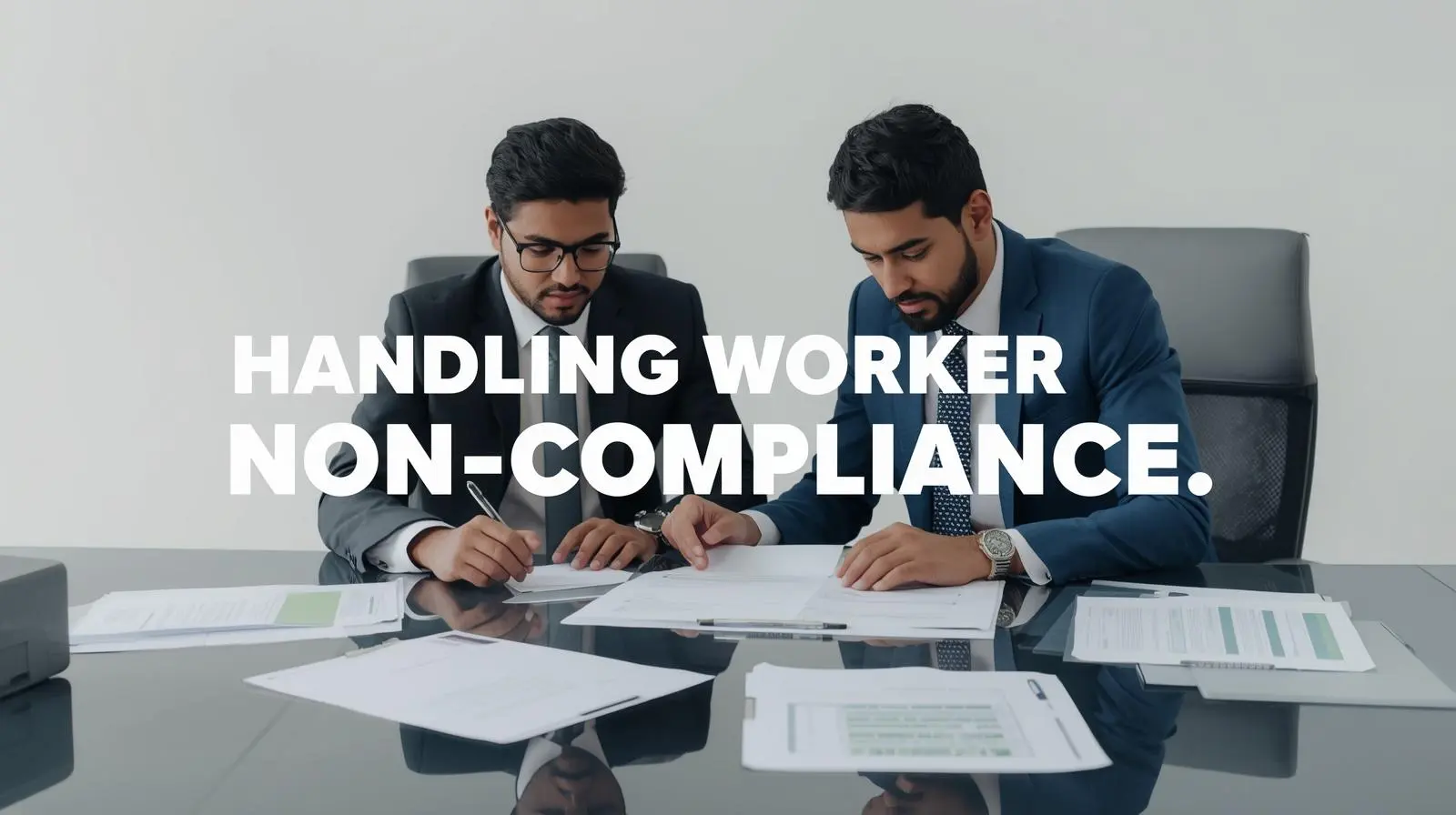Non-compliance in the workplace is not just about breaking rules — it’s about identifying where communication, awareness, or management systems have failed. In Sri Lanka, many organizations, particularly in the apparel and manufacturing sectors, use Non-Compliant Worker Reports (NCRs) to document, investigate, and resolve employee violations fairly and transparently.
This article explains how to manage worker non-compliance using the HRD/NCR/WRK/001 framework, explores best practices from local industries, and highlights why building a culture of accountability, documentation, and fairness is crucial to modern Sri Lankan HR management.
1. What Is a Non-Compliant Worker Report?
A Non-Compliant Report (NCR) is an official document used to record and address instances when an employee fails to comply with workplace standards, company rules, or legal requirements.
The HRD/NCR/WRK/001 format, as found in many Sri Lankan companies, includes fields such as:
- Employee name, ID, and department
- Nature of the violation
- Date and location of the incident
- Supervisor’s remarks and initial corrective action
- HR’s decision and follow-up
This systematic approach ensures consistency and transparency while providing a record trail for audits and compliance reviews.
➡️ External Source: Sri Lanka Department of Labour – Labour Standards & Disciplinary Guidelines
2. Common Causes of Worker Non-Compliance in Sri Lanka
Non-compliance may arise from several factors that go beyond willful misconduct. Common causes include:
- Lack of awareness of company rules and safety policies
- Language or literacy barriers, especially in factory settings
- Poor supervision or unclear expectations
- Stress, burnout, or overtime fatigue
- Cultural misunderstandings in diverse workplaces
Recognizing the root cause allows HR departments to handle issues constructively rather than punitively.
3. The NCR Process: From Detection to Resolution
A standard Non-Compliance Report (based on HRD/NCR/WRK/001) follows these steps:
- Incident Reporting
- The supervisor observes or is informed of a rule violation (e.g., absenteeism, safety breach).
- The incident is logged immediately to avoid memory bias.
- Initial Verification
- The supervisor investigates briefly to verify facts, interview witnesses, and collect documentation.
- Submission to HR
- The completed form is submitted to HR within 24 hours.
- HR assigns a reference number and records it in the compliance register.
- Employee Discussion
- The worker is given a chance to explain their side — aligning with Section 5(2) of Sri Lanka’s Shop and Office Employees Act (1954), which emphasizes fair hearing in disciplinary action.
- Corrective or Disciplinary Action
- Actions may range from verbal warnings to written notices, suspension, or retraining, depending on severity.
- Follow-Up Review
- HR tracks the worker’s improvement over 3–6 months.
- Repeat violations may trigger escalation to management or termination.
➡️ External Link: ILO Sri Lanka – Decent Work and Labour Compliance
4. Building a Fair Disciplinary Culture
Fairness and documentation are central to an effective non-compliance management process.
Best Practices:
- Always use written records (like NCR forms) for traceability.
- Ensure both worker and supervisor sign the report.
- Keep a witness during sensitive discussions.
- Focus on coaching before punishment, especially for first-time offenses.
- Translate company policies into Sinhala and Tamil to ensure accessibility.
Companies have integrated worker-friendly non-compliance procedures that emphasize education, safety, and counselling, rather than immediate penalty.
5. Case Study: Reducing Non-Compliance in a Sri Lankan Apparel Factory
Case Study: “ApparelPro Pvt Ltd” – Colombo District
In 2023, ApparelPro identified rising non-compliance incidents related to unauthorized absenteeism and safety gear negligence. The HR team introduced:
- Weekly toolbox talks explaining rules in Sinhala/Tamil
- A color-coded NCR form (green for minor, red for serious violations)
- Monthly HR–worker review meetings
- Incentives for zero-violation performance
Results after six months:
- 45% drop in repeated violations
- Improved worker morale (survey satisfaction +30%)
- Better audit readiness for foreign buyers
This demonstrates how structured compliance management fosters both discipline and trust.

“An interview is less about finding flaws — it’s about uncovering potential.”
Conducting an interview as a first-time interviewer—especially for freshers—requires preparation, empathy, and clarity. By designing a structured format, using standardized criteria, and communicating respectfully with candidates, interviewers can make better hiring decisions while fostering a positive candidate experience.
Your role as an interviewer is not just to filter — it’s to discover potential, support fair processes, and reflect the values of your organization. Start with a sound structure, listen actively, and constantly refine your approach.
Over time, you’ll become more confident, consistent, and effective — and your interviewees will leave with respect for your process.
6. Legal and Ethical Implications
According to the Wages Board Ordinance (1941) and the Factories Ordinance (1950), Sri Lankan employers must maintain proper employee records and ensure workplace safety. Failing to address non-compliance may expose companies to legal penalties or reputational harm, particularly in export-oriented sectors.
However, over-penalizing employees without due process can also violate labour rights. Hence, a balanced NCR system that combines fairness, documentation, and corrective training protects both the company and its workforce.
7. Using Data to Prevent Future Non-Compliance
Modern HR departments in Sri Lanka are adopting digital HR compliance systems to track NCR trends and identify patterns.
Using simple analytics, HR can monitor:
- Which departments have more incidents
- What times or shifts see repeated issues
- Which supervisors need more training
These insights help organizations proactively address risk areas, reduce turnover, and improve overall discipline culture.
8. Key Benefits of a Proper Non-Compliance Reporting System
✅ Ensures legal compliance with Sri Lankan labour standards
✅ Protects the rights of both employees and employers
✅ Encourages transparency and accountability
✅ Builds a culture of responsibility and fairness
✅ Improves audit readiness and buyer confidence in ethical sourcing









